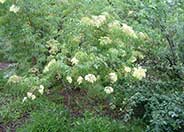
Common name:California Poppy, Golden Poppy
Botanical name:Eschscholzia californica
This small annual (sometimes acts as a perennial) plant will grow to less than 1' tall and has light, small blue green leaves with gold and orange flowers that bloom in spring and summer.

Common name:California Sagebrush
Botanical name:Artemisia californica
The California sagebrush is an evergreen medium sized, gray green aromatic shrub. The foliage has wispy soft texture.This shrub is native to CA, is drought tolerant, and attracts butterflies. This is a highly combustible plant.

Common name:Blue Elderberry
Botanical name:Sambucus mexicana
The Blue Elderberry is a deciduous shrub that grows 4'-10' tall or tree that reaches up to 40' high. The leaves of this plant have 5-9 leaflets with white spring flower clusters developing into blue berries. The Blue Elderberry is a native to California, is drought tolerant and is a beneficial insect plant.

Common name:Cedros Island Verbena
Botanical name:Verbena lilacina 'De La Mina'
Verbena lilacina 'De La Mina' is a selection introduced by the Santa Barbara Botanical Garden. It is a fast-growing shrub that reaches 3' tall and 3' wide. Flowers are purple and fragrant and bloom all year long in coastal areas. These star-shaped flowers are held high above the mound shaped foliage. It does well in sun and part sun and is considered drought tolerant. It is a beautiful shrub that attracts butterflies.

Common name:Carmel Creeper
Botanical name:Ceanothus griseus horizontalis
Carmel Creeper is one of the most popular forms of spreading shrubs. Its glossy oval leaves of 2" are bright green. The tiny, light blue flowers are abundant and form 1" clusters. This shrub benefits from pruning. It does best in well-drained soil with little to no summer water.
Sustainable Fertilization
If you mulch heavily as recommended in the compost and mulch fact sheets you should not need traditional fertilization. Sustainable landscapes fertilize themselves as soil organisms break down and recycle the dropped leaves into nutrients.
Click in the green box for more information
| Designer: Santa Barbara Botanic Garden | Santa Barbara Botanic Garden: Hillside |
Photographer: GardenSoft |
Soils and Compost:
Physical weed control, including mulching, or hand removal protects the watershed from harmful chemicals.
Water Saving Tip:
Mulching and adding compost to soil can minimize evaporation and help soil absorb and store water.
Integrated Pest Management:
Attract, or buy beneficial insects such as ladybugs and lacewings to control pest outbreaks in your garden.

